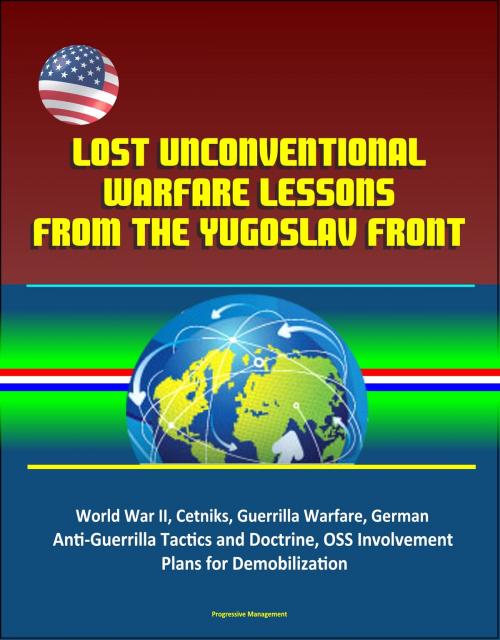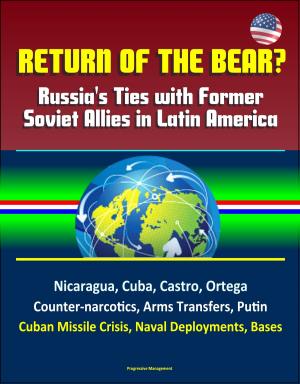Lost Unconventional Warfare Lessons from the Yugoslav Front: World War II, Cetniks, Guerrilla Warfare, German Anti-Guerrilla Tactics and Doctrine, OSS Involvement, Plans for Demobilization
Nonfiction, History, Military, United States, World War II| Author: | Progressive Management | ISBN: | 9781310207938 |
| Publisher: | Progressive Management | Publication: | June 6, 2016 |
| Imprint: | Smashwords Edition | Language: | English |
| Author: | Progressive Management |
| ISBN: | 9781310207938 |
| Publisher: | Progressive Management |
| Publication: | June 6, 2016 |
| Imprint: | Smashwords Edition |
| Language: | English |
This excellent report has been professionally converted for accurate flowing-text e-book format reproduction. During the early years of the Cold War, the United States Army developed the new doctrine of Unconventional Warfare. This doctrine focused on U.S. soldiers working through and with indigenous guerrilla units to achieve tactical successes in support of the larger theater campaign. The early doctrine writers failed to incorporate three key lessons from the guerrilla war fought in Yugoslavia (1941-1945). The lessons were the selection and employment of the right people as advisors, the effective employment of guerrillas (who have a different agenda) and setting the conditions for effective demobilization of the guerrilla force. These overlooked lessons offered a more comprehensive approach in terms of advising, employing and then demobilizing the guerrilla units in support of U.S. military objectives. The lost lessons provided valuable planning considerations for future advisory units. Through these lessons, U.S. advisors can prepare to work with robust guerrilla organizations that are not solely dependent on U.S. logistical, moral or political support.
CHAPTER 1 - INTRODUCTION * CHAPTER 2 - Doctrinal Heritage * Early Ideas of Unconventional Warfare (UW) * First Generation of UW Authors * FM 31-21 * French and Philippine Experiences * CHAPTER 3 - Guerrilla Warfare in Yugoslavia (1941-45) * Cetniks * Partisans * Guerrilla Divorce * German Anti-Guerrilla Tactics and Doctrine * Special Operations Executive Involvement * OSS Involvement * CHAPTER 4 - Three Vital Lessons Lost * Right People * Proper Employment of Guerrillas * Plans for Demobilization * CHAPTER 5 - CONCLUSION
This excellent report has been professionally converted for accurate flowing-text e-book format reproduction. During the early years of the Cold War, the United States Army developed the new doctrine of Unconventional Warfare. This doctrine focused on U.S. soldiers working through and with indigenous guerrilla units to achieve tactical successes in support of the larger theater campaign. The early doctrine writers failed to incorporate three key lessons from the guerrilla war fought in Yugoslavia (1941-1945). The lessons were the selection and employment of the right people as advisors, the effective employment of guerrillas (who have a different agenda) and setting the conditions for effective demobilization of the guerrilla force. These overlooked lessons offered a more comprehensive approach in terms of advising, employing and then demobilizing the guerrilla units in support of U.S. military objectives. The lost lessons provided valuable planning considerations for future advisory units. Through these lessons, U.S. advisors can prepare to work with robust guerrilla organizations that are not solely dependent on U.S. logistical, moral or political support.
CHAPTER 1 - INTRODUCTION * CHAPTER 2 - Doctrinal Heritage * Early Ideas of Unconventional Warfare (UW) * First Generation of UW Authors * FM 31-21 * French and Philippine Experiences * CHAPTER 3 - Guerrilla Warfare in Yugoslavia (1941-45) * Cetniks * Partisans * Guerrilla Divorce * German Anti-Guerrilla Tactics and Doctrine * Special Operations Executive Involvement * OSS Involvement * CHAPTER 4 - Three Vital Lessons Lost * Right People * Proper Employment of Guerrillas * Plans for Demobilization * CHAPTER 5 - CONCLUSION















